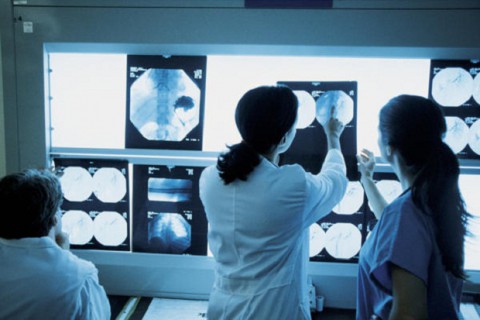 Radiology technicians play an important role in healthcare by administering diagnostic imaging exams, such as x-rays, computed tomography (CT) and magnetic resonance imaging (MRI). These radiologic procedures help physicians accurately diagnose and treat patients who may suffer from a variety of acute and chronic diseases and medical conditions.
Radiology technicians play an important role in healthcare by administering diagnostic imaging exams, such as x-rays, computed tomography (CT) and magnetic resonance imaging (MRI). These radiologic procedures help physicians accurately diagnose and treat patients who may suffer from a variety of acute and chronic diseases and medical conditions.
A career in radiology technology is often very rewarding as these diagnostic procedures can have a dramatic impact on the overall health and wellness of patients. Radiology technicians must be detail-oriented and have excellent interpersonal and communications skills. They must also be able to lift patients safely and work on their feet for long hours. Radiology technicians must also understand how to operate complicated medical machinery and must be compassionate and have a great deal of patience, as they frequently work with patients who can be confused or in pain.
Radiology Technician Job Description
Radiology technicians prepare patients for diagnostic imaging procedures, which might involve taking a medical history and answering questions about the procedure. They also prepare drink mixtures for patients that create a greater contrast for the diagnostic images. In addition, they must position the patient and the equipment faultlessly in order to get the correct image and protect the patient by covering areas that do not need to be imaged.
Once the patient is ready for the procedure, radiology technicians then operate the equipment to take the required images and ensure that the images were captured as indicated in physician orders. After the procedure is complete, they may work with radiologists examining the images to determine whether or not other images need to be taken.
Some radiology technicians specialize in a certain type of imaging and equipment such as CT and MRI. Others specialize in mammography, cardiovascular and vascular imaging, sonography or nuclear medicine imaging. Depending on the hiring facility, these specialties may or may not require certification.
Radiology Technician Career Outlook and Salary Potential
Jobs for radiology technicians are expected to grow by 28 percent nationally between 2010 and 2020, according to the Bureau of Labor Statistics (BLS) Occupational Outlook Handbook published in March 2012. The aging population is driving a dramatic increase in the demand for healthcare services, including diagnostic tests for conditions that typically occur in older patients, such as cardiovascular issues, certain types of cancer, pneumonia and osteoporosis. The majority of jobs are likely to remain in hospitals, although larger group practices and imaging centers will also be key employers.
The same BLS study lists the median annual salary of radiology technicians at $54,340 as of May 2010. Those who are interested in this career opportunity are encouraged to conduct independent research as employment opportunities and salary may vary depending on location, experience, education and other factors.
Radiology Technician Education and Training
Most radiology technicians hold a certificate or an associate’s degree in radiography, although some go on to earn a bachelor’s degree. Certificate programs typically take one year or less to complete, but associate’s degree programs are more common. Coursework usually includes anatomy, pathology, patient care, radiation physics and protection and image evaluation.
Radiology technicians must be certified or licensed in most states. Requirements vary by state, but most require technicians to graduate from a program accredited by the Joint Review Committee on Education in Radiologic Technology (JRCERT), which accredits educational and training programs in radiography. Technicians also must pass a certification exam to be eligible for licensure. Certification exams may be administered by the state or by The American Registry of Radiologic Technologist (ARRT). Continuing education credits are required for technicians to maintain their certification.









